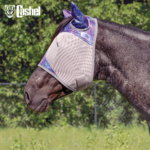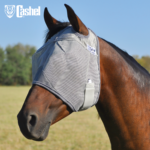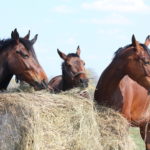
Today, roughly 17 percent of American Quarter horses are older than 20 years of age (equivalent to about 61 years in human years). There are several reasons that horses are living longer, with the most obvious being improved nutrition, veterinary and farrier care.
However, the change in how people use their horses has also played a role. As most horses have moved from primarily work animals to recreational animals they have experienced fewer injuries and less stress I personally had a good Quarter Horse gelding that was still athletic and being ridden by our grandchildren until he died suddenly of a ruptured aneurism at 33 (93 in human years).
Most horses are capable of being ridden well into their 20s, but they need some special considerations when traveling.
Disease Prevention
As horses age, their immune systems are not as efficient, so special attention should be given to keeping them current on vaccinations. If they are going to a trail ride or competition where they will be in contact with other horses, make sure they are boostered against equine influenza (flu) and equine herpes virus types 1 and 4 (rhino) a couple of weeks before the trip.
If you have to tie them in the trailer, make sure you tie them loosely so they can drop their heads to cough and clear their airways. Cross tiesdo not allow this and can predispose horses to respiratory infections.
It’s also a good idea to not allow them to drink from communal water troughs, as they may pick up contagious diseases.
Fatigue
Because horses riding in trailers are constantly working to maintain balance while the truck is accelerating, decelerating or turning, make sure your older horses are? hauled either in a trailer with a center partition and secure butt bar they can lean on for support or a large, single box stall where they can lie down if they become fatigued.
Most older horses have some level of arthritis, so extra bedding of clean straw or wood shavings (not sawdust) will also lessen the stress on their joints. Provide plenty of ventilation, preferably from a ceiling vent rather than a vent blowing directly on the horse.
It’s always a good idea to take a one-hour break every six hours on a long trip to allow the horse to rest. You don’t have to unload the horse and exercise him; simply stopping the trailer where he no longer has to work to maintain balance will provide him an opportunity to rest.
Feed and Water
Generally, I like to provide trailered horses free choice hay as it keeps them occupied and their intestinal tracts working.
However, many geriatic horses have dental problems that make it difficult for them to chew long-stemmed hay, and they could choke. Therefore, have your older horse’s teeth checked at least annually and floated if necessary. If your geriatric horse takes a long time to eat hay, consider providing hay pellets or a complete geriatric feed high in fiber, but only during stops.
The physical effort of balancing in a moving trailer and the lack of availability of water may cause dehydration.All horses are prone to dehydration during transport, but a geriatric horse’s condition will deteriorate more quickly and be more difficult to reverse. Therefore, pull over every three hours or so and offer them water, preferably with buckets and water from home that they?re accustomed to.
When you reach your destination, make sure you put them in a quiet stall with free access to ensure they rehydrate.
There’s no reason to leave our older, reliable horses at home when we strike out on a trip, but they do have special needs that can be easily accommodated with a little preplanning.
Dr. Thomas R. Lenz is a veterinarian and regular columnist in The American Quarter Horse Journal. Dr. Lenz is also an American Association of Equine Practitioners past president.





